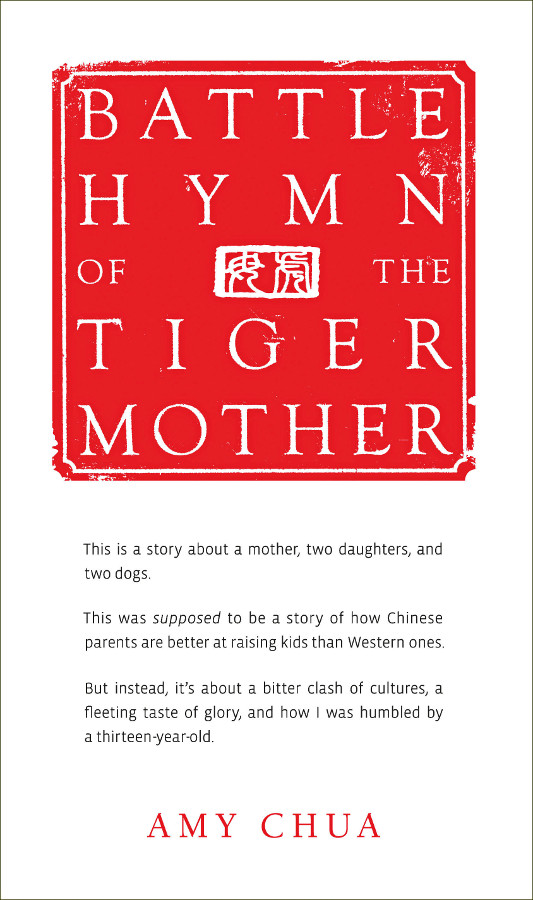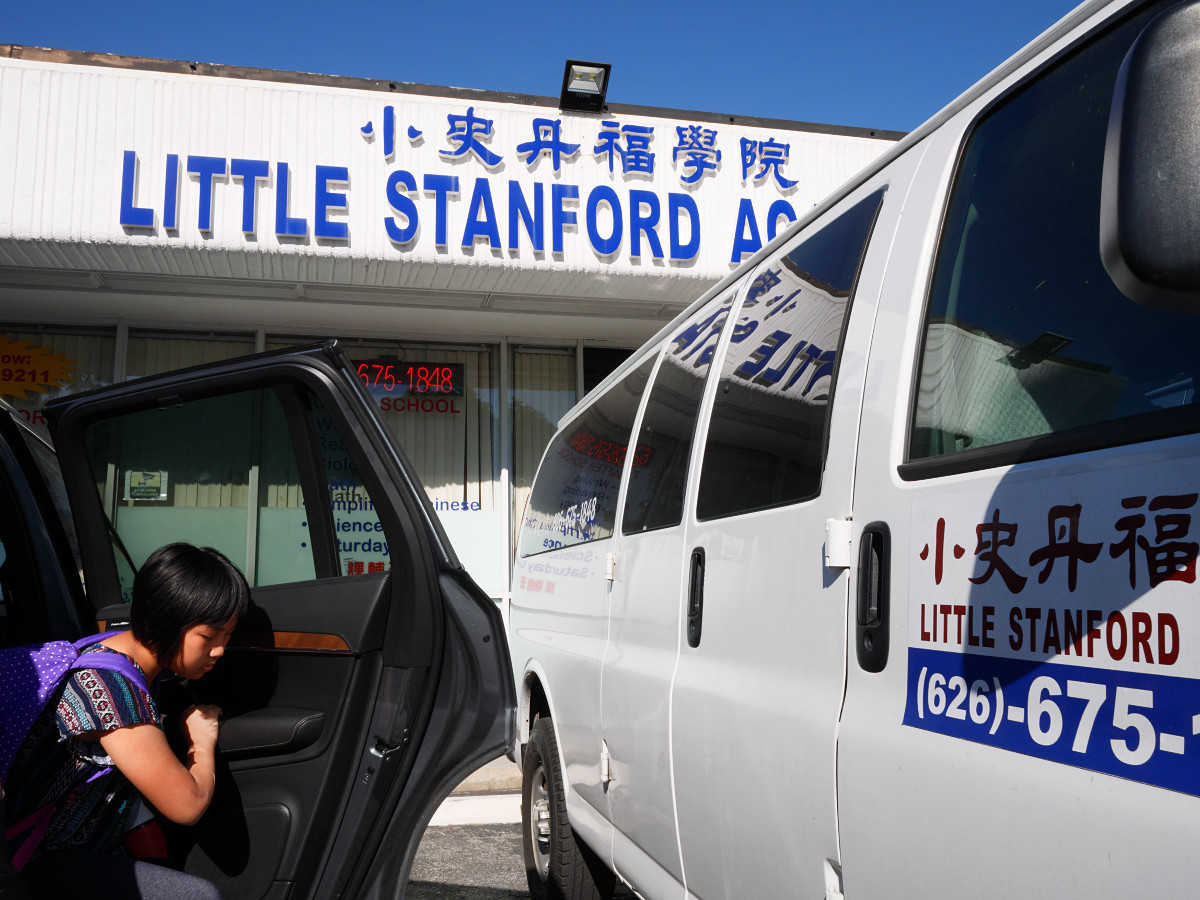A Convenient Effigy
“No one wants to be a pariah,” declares Yale law professor Amy Chua in her book “Battle Hymn of the Tiger Mother,” a memoir of her experiences parenting her daughters, Sophia and Lulu, as a traditionally strict Chinese mother set adrift in liberal New England.
Yet a pariah she became, when excerpts from the book were published in the Wall Street Journal in 2011, a few days ahead of the book’s release. In the article, audaciously titled “Why Chinese Mothers Are Superior” — a headline Chua denies writing, pointing a finger at WSJ editors — Chua describes how she forbade her daughters from having sleepovers, playdates, or getting any grade less than an A, and recounts calling one “garbage” while not letting the other have food, water, or even a bathroom break during an hours-long piano practice session. The piece went viral, igniting a firestorm on comment boards, blogs and social media, with some calling for the author’s arrest on charges of child abuse. She was forced to defend herself on news segments and talk shows, received an anonymous parcel containing a shredded copy of her book, and even had to hire private security after receiving death threats.

By Amy Chua
240 pp. Penguin. $16.00.
I was born in Canada to Hong Kong immigrants and am myself a product of Chinese parenting, probably better known in the West as the authoritarian parenting style but infused with Confucius-flavoured narcissistic personality disorder and traditionally served off the wrong end of a feather duster. Now a father myself, it took five years of being annoyed and occasionally horrified at the tiger mother-tagged articles popping up in my parenting news feed before I finally caved in and picked up a copy of the book to see what the fuss was about.
It was not what I expected.
That Chua was playing with fire is indisputable. Her husband, Jed Rubenfeld, even warned her as much: “Amy, you are going to get slaughtered for this.” And, whether she intended it or not, her timing was impeccable. Child development experts in the prewar West preached rigidity and distance, warning parents that coddling children would stunt their development. The publication of “The Common Sense Book of Baby and Child Care” by Dr. Benjamin Spock in 1946 upended that dogma. Arguing for a warmer, instinctive and child-centric approach to parenting, it became one of the most popular books ever published in any genre, revolutionizing the way Western baby boomers and Generation Xers were raised.
Meanwhile, market reforms initiated in the late 1970s paved the way for China’s rise as an economic superpower, even as major American manufacturing industries declined and collapsed. In 2009, two years before “Battle Hymn of the Tiger Mother” was published and amid the worst economic downturn in the U.S. since the Great Depression, Shanghai Chinese students took the Programme for International Student Assessment test for the first time and clobbered everyone, ranking first in all three subject areas in a field of 74 participating countries and wiping the floor with the Americans, who finished 17th, 23rd, and 31st in reading, science, and math, respectively.
The irony of yet another humiliation by an increasingly influential yet officially communist (ahem, ‘socialist’) country wasn’t likely lost on the book’s target demographic: Western parents of school-age children who themselves grew up during the Cold War and were raised on the virtues of individualism and liberty. Against the backdrop of American exceptionalism in the throes of its deepest self-esteem crisis in decades, it didn’t take much for Chua’s writing style — inflammatory at times and peppered with name-drops like Harvard, Stanford, Yale, and Carnegie Hall — to set off parents already uneasy at the prospect of a future for their children in which a run-of-the-mill college degree no longer guaranteed anything except for an armoured truckload of nondischargeable debt.
For one thing, it was almost immediately apparent that the excerpts in the WSJ article had been lifted from the most controversial passages in the first quarter of the book, which when read in context appear to have been deliberately written provocatively to set up the rest of the story. There’s no such thing as bad publicity, as the saying goes, and it seems that whoever cherry-picked the excerpts for the article was specifically trying to get a rise out of people. In any case, it worked, and spectacularly so: readers left more than 10,000 comments on the WSJ site while the book was a veritable blockbuster, reaching #4 on Amazon and spending 11 weeks on the New York Times best-seller list.
And then there’s Chua’s husband, blasted in most critiques for not doing more to defend his daughters against the torrent of verbal abuse hurled at them by their mother. According to Chua, Rubenfeld had been raised under the very permissive parenting style she rails against, yet somehow managed to attend Princeton, Juilliard, and Harvard, ultimately becoming a federal prosecutor and, like his wife, a best-selling author and professor at Yale. By Chua’s admission to their daughters: “After all, Daddy turned out fine.”
It is also Rubenfeld who reminds Chua what happened to her father, Leon, an accomplished electrical engineer and computer scientist. Born in the Philippines to Chinese parents, the elder Chua had suffered at the hands of his own tiger mother, whom he “barely spoke to” and “never thought about … except in anger,” forcing the author to admit that Chinese parenting “doesn't always succeed,” something that she “never wanted to think about.” Chua’s inclusion of both her father and her husband in her story pokes a sizable hole in the contention that she is out to show parents of the non-tiger variety that they’re doing it wrong.

The last third of the book is devoted to Lulu’s rebellion, a battle of wills that comes to a head during a family vacation in Moscow. In a café by the Red Square, while being browbeaten for refusing to try caviar (“Lulu, you sound like an uncultured savage”), Lulu finds the weakness — the heresy of public disobedience — in the ultimate power of the Tiger Mother, torpedoing it into oblivion with a hurled drinking glass in front of horrified patrons. Forced into submission by a raging 13-year-old who just wants to play tennis and otherwise be left alone, the Tigress consoles herself as she licks her wounds: At least tennis has Asian street cred.
And therein lies the twist.
See, my Chinese mother would have removed the plate in front of me until at least one spoonful of briny eggs was chewed and swallowed, and an empty mouth inspected to satisfaction. Then, I would have spent the rest of the day dreading whatever horrible fate was to befall me once we were back in the privacy of our hotel room, for daring to not only defy her but make a dramatic public spectacle of it. I doubt that my version of this story would have surprised anyone by this point in the book. But Chua didn’t go full dark side: She came to her senses and backed off. In doing so, she chose instead to face one of her greatest fears: the loss by her children of the social and materialistic status that she and her parents had worked so hard, and sacrificed so much, to achieve.
Some of Chua’s most vehement critics are Asian Americans who carry the scars of similar experiences, and thanks to our cultural reluctance to confront and therefore disrespect our elders, Chua’s thrusting herself into the public eye made her a convenient effigy. But as someone who was about to grab my torch and pitchfork over what I read about the book before I read the book itself, it was almost disappointing that the uproar over “Battle Hymn of the Tiger Mother” turned out to be a whole lot of ado about little. If nothing else, at least by Chua’s account there is now one crazy Chinese mother fewer running amok, which even her staunchest critics would probably agree is for the better.